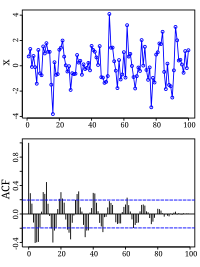
Photo from wikipedia
A range-separated short-range DFT (density functional theory) long-range RPA (random-phase approximation) electron correlation method has been derived that is fully optimised with respect to variations in the orbitals and orbital… Click to show full abstract
A range-separated short-range DFT (density functional theory) long-range RPA (random-phase approximation) electron correlation method has been derived that is fully optimised with respect to variations in the orbitals and orbital eigenvalues. The method both exhibits a reduced dependence on the basis set size compared to the full-range RPA correlation method and can be implemented with a computational algorithm which scales only with the fourth power of the molecular size, thus is feasible also for describing large electronic systems. The performance of the functional has been tested for describing the reaction energies of a set of 16 chemical reactions as well as for describing first-order electric properties. In these studies, the influence of the range-separation parameter $$\mu $$μ on the results has been analysed. Utilising accurate coupled-cluster results as a reference, it will be shown that at values of $$\mu =1.0-2.0$$μ=1.0-2.0 higher accuracies relative to the full-range DFT functional (corresponding to $$\mu =0$$μ=0) on the one hand and the full-range RPA functional (corresponding to $$\mu =\infty $$μ=∞) on the other hand can be achieved.
Journal Title: Theoretical Chemistry Accounts
Year Published: 2018
Link to full text (if available)
Share on Social Media: Sign Up to like & get
recommendations!